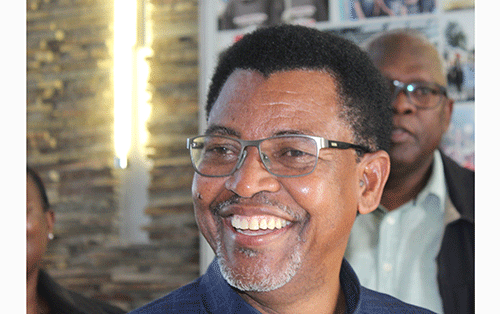Career spy Tylvas Shilongo’s stint as the Anti-Corruption Commission’s executive director got a boost this month after his contract – which lapses in August – was extended by 24 months.
He will be 62 when his current contract runs out.
This was revealed by the commission’s deputy director general Erna van der Merwe on Monday.
Shilongo took over from Hannu Shipena, who was redeployed to the National Council of Higher Education.
Until August 2020, Shilongo served as senior general manager at the Namibia Central Intelligence Service (NCIS).
At the time, his deployment to the ACC was seen by opposition parties and certain quarters of society as an attempt to interfere with ongoing investigations into the Fishrot scandal.
The government has denied this theory.
New Era caught up with Shilongo on the sidelines of the commemoration of Corruption Day.
He was elated by the confidence his appointing authority – Prime Minister Saara Kuugongelwa-Amadhila – has in his abilities.
According to him, he had already packed his bags and was ready to go home.
“I would have wanted to go on retirement but I was requested to stay on. Maybe the appointing authority might have seen the potential in me. Maybe they might have realised that I still have to do what I should have left incomplete,” Shilongo said.
His new contract ends in June 2024.
Key on his bucket list is to see through the implementation of the National Anti-Corruption Strategy and Action Plan for 2021 to 2025, he said.
“That is the duty that I have in terms of putting in place [I am not saying things are not in place. My predecessor did a marvellous job], but we need to continue where he left off,” Shilongo noted.
The past 24 months at the helm of the country’s premier anti-graft body have been more of induction, he continued.
“Now that I am given an opportunity for another two years, I think I will make sure the national strategy has delivered to the letter and make sure that all the stakeholders that are part in terms of the inclusivity, empowerment of the society and broad-based participation with the citizens are achieved so that every stakeholder contributes and is part of the fight,” he explained.
He was quick to note that the role of the media in combating and preventing corruption cannot be overemphasised.
More so, as the chief administrator at the ACC, Shilongo would not go without delving into some challenges they are confronted with.
“We are challenged with resources – be it financial or human,” he said.
The ACC, however, finds solace in the government’s political will to fight corruption.
“You could even see how parliament is actually on our side. Our chief, where we report, the Speaker, tabled our budget in parliament, and you see that the ACC is not adequately resourced,” he said.
For the current financial year, the ACC was allocated N$63 million by the treasury.
Over 80% of this goes into personnel-related expenditure.
Shilongo is, however, not naïve, conceding that State coffers have dwindled dramatically in recent times.
He pointed to the perennial drought, the slow-down in the global economy and the Covid-19 pandemic as factors affecting the government’s general expenditure.
“Going into the mid-year budget review, we were promised that they will look at that and we cross our fingers,” he said.
Like many government entities, the ACC has also adopted a culture of doing more with limited resources.
At the same time, after 14 years of service at the anti-corruption body, Christine Liswaniso, acting head for public education and corruption prevention, will bow out by the end of July, and it was also announced.
She joined the ACC at its infancy.
– emumbuu@nepc.com.na


